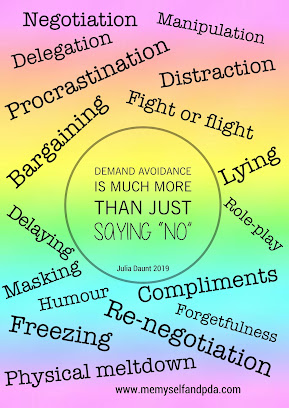What does your autistic partner struggle with?
Although each person is different and our partners may be quite able in many areas of their lives, every now and then we may need a reminder about the kinds of struggles our partners may face on a daily basis. The list below is long and by no means exhaustive.
If at any point you feel overwhelmed and need a fun break, search online for “neurotypical disorder” and/or “allism spectrum disorder” to get a glimpse of how some autistic people might view non-autistic people 😀.
Autistic people in general tend to:
Exhibit "challenging" behaviours because they are triggered by things that have just happened (like unexpectad changes/delays in their routine or disappointments, interrupting their favourite activity, a noisy or brightly-lit environment, lack of desired attention, whether their favourite person is present or not, lack of structure, threats to self-esteem, etc.) or as a consequence of a longer-term event (such as when they haven’t slept or eaten properly or the family is in a period of transition).
- Not know and/or understand the unwritten rules around what is socially acceptable or not, so they may unknowingly make insensitive or insulting comments or stand too close to another person.
Struggle with some executive functions, which may make it difficult for them to manage attention and/or time, plan and organise, prioritise and hold key information in their mind, avoid saying or doing the wrong things, and have significant difficulties managing strong feelings and understanding why they are feeling a particular way.
Struggle with anxiety to the point that it may become overwhelming and fight (e.g. showing verbal or physical aggression), flight (e.g. running away, avoiding), freeze (e.g. shutting down or blending into the background).

- Have difficulties communicating what they need or want because of their difficulties with verbal and non-verbal communication.
Struggle with small talk or to have reciprocal conversations (they may not know how to start or keep a conversation going and/or focus on things that interest them/they know about).
Find it hard to understand other people’s body language and tone of voice.
Have a very literal understanding of language and may find analogies, metaphors and idioms confusing.
Struggle to understand and interpret other people’s thoughts, feelings and behaviours.
Have difficulties predicting what will happen next in social situations (for instance, will struggle with taking turns in conversations).
Have an intense interest in certain activities, objects or people (which we can call their “special interest”). These can change over time or they can remain the same over many years.
Struggle with anxiety to the point that it may become overwhelming so your partner may engage in repetitive behaviours or retreat into familiar routines to shut the issue and related thoughts out.
Experience difficulties with sleep especially when they experience a higher level of anxiety, sensory sensitivities, unhelpful routines or a lack of daytime routines and structure.
Can be hyposensitive or hyper-sensitive to sensory and bodily perceptions, such as tastes, sounds, smells, visual input, balance and spatial orientation, and internal physical body states such as feeling hungry or knowing when to use the toilet.
Have problems associated with eating (such as issues with the taste, texture and smell of something or demanding that their food should not touch other foods on their plate; overeating; undereating or having a strict, restrictive palette.
Have you identified any of the above in your partner?
A FEW USEFUL GENERAL STRATEGIES to help our partners with their struggles due to autism:
If your partner has not understood something, don’t paraphrase. Try to repeat the message the same way, because may be they can only process half of it each time, if you change everything it’s like starting a new sentence.
Check that your partner has understood what you have said; “did that make sense?”.
Try to respect their structure and routine
Remind your partner to take regular breaks. They might need time on their own or to spend time engaging in a special interest in order to recharge their energy batteries and reduce anxiety.
Check your house/environment for potential triggers such as background noise and demanding tasks.
Try not to give your partner too many options and instead provide a limited choice. This helps to give them alternatives that they can control while reducing the demand for them to decide so it is less overwhelming.


Comments
Post a Comment